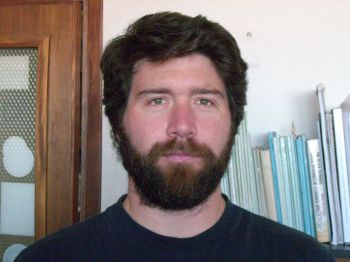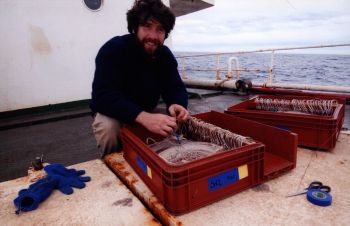Juan Pablo Seco Pon (Laboratorio de Vertebrados, Instituto de Investigaciones Marinas y Costeras, Facultad de Ciencias Exactas y Naturales, Universidad Nacional de Mar del Plata, Argentina) and ACAP South American News Correspondent has been awarded his PhD with distinction by the National University of Mar del Plata this month for his study of the interactions between pelagic seabirds and Argentinian trawlers.

The English abstract of his thesis follows:
“This thesis addresses various aspects of the interaction between pelagic seabirds and the commercial ice trawl fishery targeting hake Merluccius hubbsi in Argentine waters. The information was collected at sea on board trawlers pertaining to this fleet. The results presented here clearly highlight the importance of fishery discard triggering the attendance of seabirds and the effect it has on the abundance and composition of the assemblages, as well as on the level of interactions. We quantified in detail the interactions with different sections of the fishing gear and showed the importance of the net-sonde cable in seabird contact rate. We also assessed the ecosystem value from the use of fish by-catch reduction devices, particularly focusing on its effect on seabird abundance and interaction levels. The ice trawl fleet produces large quantities of discards (unwanted species and sizes) which are taken by seabirds. Although such use of discards can be considered as a trophic “subside” [subsidy] from the fishery, it is clear that for species with history traits like albatrosses and petrels the negative impact in terms of incidental mortality largely overwhelms any positive effect of such subside. The strategic management of discards in this fishing fleet (as in other fishing gears and fleets) should be the priority to be deepened in the national agenda to solve the problem of incidental mortality of seabirds.”

Juan Pablo aboard a longliner in the South Atlantic
Juan Pablo works within the Vertebrate Research Group at the National University of Mar del Plata which is headed by Marco Favero, who has been Chair of ACAP’s Advisory Committee since 2007.
The ACAP Secretariat extends its congratulations to Juan Pablo and looks forward to a continued collaboration.
With thanks to Marco Favero for information.
Reference:
Seco Pon, J.P. 2014. Asociacion de aves marinas pelagicas a la flota de arrastre de altura: characterizacion integral de las interacciones y desarrollo de una estrategia de conservacion para especies amenazadas. [Seabirds attending the high-seas trawl fleet: comprehensive characterisation of interactions and development of a conservation strategy for threatened species]. PhD Thesis, Universidad Nacional de Mar del Plata, Argentina. 161 pp.
John Cooper, ACAP Information Officer, 16 March 2014

 English
English  Français
Français  Español
Español